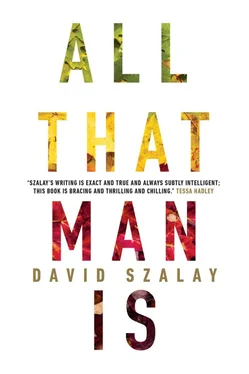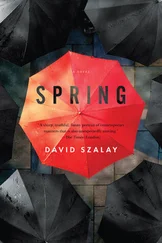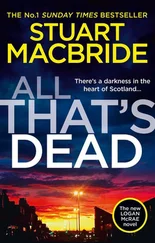‘We won’t hold dat against her,’ Hans-Pieter says, almost suavely.
‘She’s always telling me I should lose weight.’
‘Don’t listen to her.’
‘It’s true — I should.’
‘Absolutely not,’ Hans-Pieter tells her. And then says to Murray, ‘So will you do it? Take her for a drink?’
It’s awkward, saying something like, ‘Not on your life, no fucking way,’ with Maria standing there, still smiling at him, a piece of pink-dyed hair falling over her eye.
‘You got a picture?’ he asks her after a few moments. ‘I mean, on your phone or something?’
‘Maybe,’ she says. ‘Yeah, here.’
Leaning forward over Hans-Pieter’s shoulder, she passes Murray her phone.
He looks.
A woman holding a cat. Not very easy to make out. Thinner than Maria, yes. Okay? Maybe.
‘What about your father?’ he asks, handing back the phone without saying anything about the photo, and smirking. ‘He won’t mind?’
‘He lives in Austria,’ she says. ‘And they’re divorced. Obviously.’
‘Obviously,’ Murray says. It had been a joke. He had assumed that her father wasn’t still on the scene. ‘Okay,’ he says. ‘I’ll give it a go.’
‘Do you want her number then?’ Maria asks.
‘She speaks English, does she?’
‘Of course.’
‘Or why don’t you call her?’ he suggests, suddenly nervous. ‘Set it up.’
Leaning on his shoulder, she looks at Hans-Pieter, wanting his opinion, perhaps even his permission.
‘Sure,’ Hans-Pieter says. ‘Set it up.’
Without warning, another leaf detaches itself from one of the trees outside and drops down to the pavement.
—
On his way home, a few hours later, Murray stops at Oaza to pick up a kebab. The plastic sign — palm tree, smiling camel — is illuminated in the gloom. One of the Albanian twins is standing around near the entrance, keeping an eye on things. He does not acknowledge Murray, and Murray, after a moment’s hesitation, says nothing to him either. Having ordered in English, he just waits there for his kebab, eyeing the slices of baklava as if wondering whether to have one. He wishes more than ever that the twins would offer him some sign, some little sign, that they looked on him as an equal — as an equal, no more than that. Damjan had been honoured with a nod, a few words, had been thereby elevated in Murray’s estimation. He thinks more highly of Damjan now. The baklavas shine, sodden with honey. Yes, Damjan seems in some way superior to him now.
Seemingly unaware of Murray’s presence the twin exchanges a few words, in some language Murray does not know, with the kebabist, who is shoving tongfuls of shredded salad into a pitta. He spoons on the sauces and hands Murray his supper, tightly wrapped in tinfoil, warm to the touch.
‘Thanks,’ Murray says.
The man just nods.
And then, as he leaves, Murray does it. He looks the twin straight in the eye. He says, in a loud firm voice, ‘See ya, then, pal.’
And then he is outside, in the night air.
The twin had said nothing to him. Nothing.
Maybe he was just surprised.
—
That night Murray has a dream. He is lying on his bed. Outside, rain is falling — falling heavily and steadily. The window is open. He is lying on his bed, listening to the rain. It is like rain he might have listened to somewhere else, long ago. The room is strangely empty. There is nothing in it except the bed on which he is lying with his head at the wrong end, where his feet should be. He lies there listening to the rain and from the darkness of the bathroom, a large dog emerges — an Alsatian. Panting quietly, the dog lies down on the floor next to the bed. As it lies down it knocks over a glass that is there — the sound of the glass falling and then rolling a little way across the floor. With a tiny whimper the dog yawns, and then starts to pant again. The rain is still falling. Without otherwise moving, Murray has stretched out his hand and is stroking the dog’s neck, the deep fur. The dog pants quietly. The rain falls and falls, making a puddle on the floor next to the open window.
—
On Sunday afternoon he takes Maria’s mother out for a drink.
He was relieved, when they met outside the Irish pub, not to fancy her at all. Not at all. She was a tallish middle-aged woman, ungainly in a pair of jeans, her short hair dyed a deep purple like the outside of an aubergine.
When they shook hands, her hand felt frozen and knobbly in his.
The Irish pub was just about the poshest place in town, where the top people from the town hall went, and the senior members of the local mafia. A Guinness in there was almost as expensive as it would be in London. The interior was like a transients’ pub near a large British mainline station. Very tired and heavily soiled. To that extent, it was authentic. The table service was not.
They sat in a padded booth facing each other and Murray asked the waiter for a half-litre of stout. Maria’s mother had a white wine.
Not fancying her at all, Murray was less nervous than he had feared he might be. Her English was excellent, and soon he was telling her about London and telesales and, less forthcomingly, about Scotland. She seemed interested in Scotland, kept asking him questions about it. He didn’t much want to talk about that. As darkness fell outside, he was telling her about the Mercedes S-Class he had once had, and the top-of-the-range Michelin tyres he had put on it. ‘Top top quality,’ he told her.
She nodded. She was drinking her second glass of wine.
He was on his third stout. ‘Makes a big difference, the tyres,’ he told her, encircling the stout with his hands.
‘I know,’ she said.
‘Huge difference.’
She was a schoolteacher, an English teacher. And maybe, he thought, he did fancy her slightly after all.
She’d seemed as interested in the S-Class as any woman ever had, he’d say that for her. She’d wanted him to explain what an S-Class was , for a start. So he’d walked her through the entire Mercedes range, from the 1.8 litre A-Class through the C- and E-Classes, the various engine options available for those, all the way up to the S 500 L.
It took about half an hour.
Then he said, ‘What sort of car do you drive?’
Some Suzuki, she said.
He said he didn’t know much about Suzukis.
‘Never mind.’
‘Happy with it?’ he asked.
She nodded, smiled. ‘It’s fine.’
‘What…What size engine’s it got?’
She seemed to find something funny about the question. She laughed anyway. ‘I don’t know. I’m so happy about Maria and Hans-Pieter,’ she said. ‘He’s such a nice man.’
‘Oh, yeah,’ Murray agreed vaguely, looking out of the window for a moment. He didn’t want to talk about Hans-Pieter, that was for sure.
‘I wish Maria would lose some weight,’ her mother said earnestly. ‘Don’t you think she should lose some weight?’
‘Definitely.’
‘Will you mention it to her? She doesn’t listen to me.’
‘Me?’ Murray said, not knowing quite what to make of this. ‘Sure. I’ll have a word wi’ her. D’you want another drink?’
‘I’m okay. Thank you.’
Starting on his fourth stout he decided that he definitely did fancy her, quite a lot.
He was telling her about his business — the airport transfer thing. He had finally managed to get hold of Blago — ‘my local partner’ was how he described him to Maria’s mother — and Blago had told him that the money had arrived safely. They would drive down to Osijek next week, was the idea, to have a look at the ex-police minibuses. Make a decision on that. It was moving forward. He told her it had the potential to turn into something ‘fairly major’. Looking her intently in the eye, he said, ‘The transport sector’s woefully underdeveloped in this part of Croatia.’
Читать дальше












